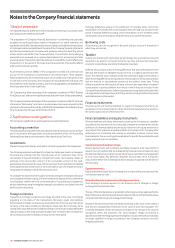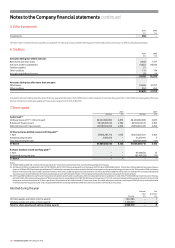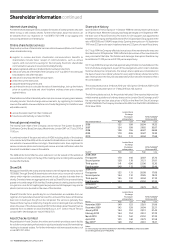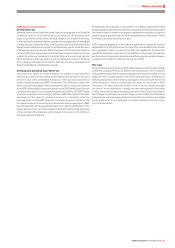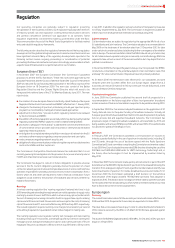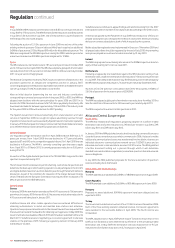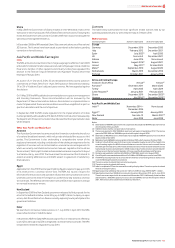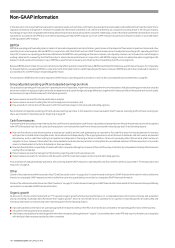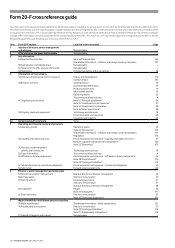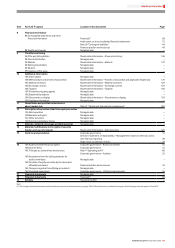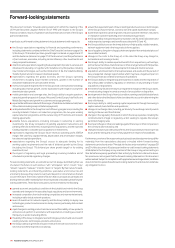Vodafone 2010 Annual Report Download - page 132
Download and view the complete annual report
Please find page 132 of the 2010 Vodafone annual report below. You can navigate through the pages in the report by either clicking on the pages listed below, or by using the keyword search tool below to find specific information within the annual report.
130 Vodafone Group Plc Annual Report 2010
Shareholder information continued
A US holder is not subject to a UK withholding tax. The US holder includes in gross
income for US federal income tax purposes only the amount of the dividend actually
received from us and the receipt of a dividend does not entitle the US holder to a
foreign tax credit.
Dividends must be included in income when the US holder, in the case of shares, or
the depositary, in the case of ADSs, actually or constructively receives the dividend
and will not be eligible for the dividends-received deduction generally allowed to US
corporations in respect of dividends received from other US corporations. Dividends
will be income from sources outside the United States. For the purpose of the foreign
tax credit limitation, foreign source income is classified in one or two baskets and the
credit for foreign taxes on income in any basket is limited to US federal income tax
allocable to that income. Generally the dividends we pay will constitute foreign
source income in the passive income basket.
In the case of shares, the amount of the dividend distribution to be included in income
will be the US dollar value of the pound sterling payments made determined at the
spot pound sterling/US dollar rate on the date of the dividend distribution regardless
of whether the payment is in fact converted into US dollars. Generally any gain or loss
resulting from currency exchange fluctuations during the period from the date the
dividend payment is to be included in income to the date the payment is converted
into US dollars will be treated as ordinary income or loss. Generally the gain or loss
will be income or loss from sources within the United States for foreign tax credit
limitation purposes.
Taxation of capital gains
UK taxation
A US holder may be liable for both UK and US tax in respect of a gain on the disposal
of our shares or ADSs if the US holder is:
a citizen of the United States resident or ordinarily resident for UK tax purposes in
the United Kingdom;
a citizen of the United States who has been resident or ordinarily resident for UK
tax purposes in the United Kingdom, ceased to be so resident or ordinarily resident
for a period of less than five years of assessment and who disposed of the shares
or ADSs during that period (a ‘temporary non-resident’), unless the shares or ADSs
were also acquired during that period, such liability arising on that individual’s
return to the UK;
a US domestic corporation resident in the United Kingdom by reason of being
centrally managed and controlled in the United Kingdom; or
a citizen of the United States or a US domestic corporation that carries on a trade,
profession or vocation in the United Kingdom through a branch or agency or, in
the case of US domestic companies, through a permanent establishment and that
has used the shares or ADSs for the purposes of such trade, profession or vocation
or has used, held or acquired the shares or ADSs for the purposes of such branch
or agency or permanent establishment.
Under the treaty capital gains on dispositions of the shares or ADSs are generally
subject to tax only in the country of residence of the relevant holder as determined
under both the laws of the United Kingdom and the United States and as required by
the terms of the treaty. However individuals who are residents of either the United
Kingdom or the United States and who have been residents of the other jurisdiction
(the US or the UK, as the case may be) at any time during the six years immediately
preceding the relevant disposal of shares or ADSs may be subject to tax with respect
to capital gains arising from the dispositions of the shares or ADSs not only in the
country of which the holder is resident at the time of the disposition but also in that
other country (although, in respect of UK taxation, generally only to the extent that
such an individual comprises a temporary non-resident).
US federal income taxation
Subject to the PFIC rules described below a US holder that sells or otherwise disposes of
our shares or ADSs will recognise a capital gain or loss for US federal income tax
purposes equal to the difference between the US dollar value of the amount realised
and the holder’s tax basis, determined in US dollars, in the shares or ADSs. Generally
a capital gain of a non-corporate US holder that is recognised in tax years beginning
before 1 January 2011 is taxed at a maximum rate of 15% provided the holder has a
holding period of more than one year. The gain or loss will generally be income or loss
from sources within the United States for foreign tax credit limitation purposes. The
deductibility of losses is subject to limitations.
Taxation
As this is a complex area investors should consult their own tax advisor regarding the
US federal, state and local, the UK and other tax consequences of owning and
disposing of shares and ADSs in their particular circumstances.
This section describes, primarily for a US holder (as defined below), in general terms,
the principal US federal income tax and UK tax consequences of owning or disposing
of shares or ADSs in the Company held as capital assets (for US and UK tax purposes).
This section does not however cover the tax consequences for members of certain
classes of holders subject to special rules including officers of the Company,
employees and holders that, directly or indirectly, hold 10% or more of the Company’s
voting stock.
A US holder is a beneficial owner of shares or ADSs that is for US federal income
tax purposes:
a citizen or resident of the United States;
a US domestic corporation;
an estate, the income of which is subject to US federal income tax regardless
of its source; or
a trust, if a US court can exercise primary supervision over the trust’s administration
and one or more US persons are authorised to control all substantial decisions of
the trust.
If a partnership holds the shares or ADSs, the US federal income tax treatment of a
partner will generally depend on the status of the partner and the tax treatment of
the partnership. A partner in a partnership holding the shares or ADSs should consult
its tax advisor with regard to the US federal income tax treatment of an investment in
the shares or ADSs.
This section is based on the Internal Revenue Code of 1986, as amended, it s legislative
history, existing and proposed regulations thereunder, published rulings and court
decisions, and on the tax laws of the United Kingdom and the Double Taxation
Convention between the United States and the United Kingdom (the ‘treaty’), all as
currently in effect. These laws are subject to change, possibly on a retroactive basis.
This section is further based in part upon the representations of the depositary and
assumes that each obligation in the deposit agreement and any related agreement
will be performed in accordance with its terms.
Based on this assumption, for purposes of the treaty and the US-UK double taxation
convention relating to estate and gift taxes (the ‘Estate Tax Convention’), and for US
federal income tax and UK tax purposes, a holder of ADRs evidencing ADSs will be
treated as the owner of the shares in the Company represented by those ADSs.
Generally exchanges of shares for ADRs and ADRs for shares will not be subject to US
federal income tax or to UK tax other than stamp duty or stamp duty reserve tax (see
the section on these taxes on the following page).
Taxation of dividends
UK taxation
Under current UK tax law no withholding tax will be deducted from the dividends we
pay. Shareholders who are within the charge to UK corporation tax will be subject to
corporation tax on the dividends we pay unless the dividends fall within an exempt
class and certain other conditions are met. It is expected that the dividends we pay
would generally be exempt.
A shareholder in the Company who is an individual resident for UK tax purposes in the
United Kingdom is entitled, in calculating their liability to UK income tax, to a tax
credit on cash dividends we pay on our shares or ADSs and the tax credit is equal to
one-ninth of the cash dividend.
US federal income taxation
Subject to the PFIC rules described below, a US holder is subject to US federal income
taxation on the gross amount of any dividend we pay out of our current or
accumulated earnings and profits (as determined for US federal income tax purposes).
Dividends paid to a non-corporate US holder in tax years beginning before 1 Januar y
2011 that constitute qualified dividend income will be taxable to the holder at a
maximum tax rate of 15% provided that the ordinary shares or ADSs are held for more
than 60 days during the 121 day period beginning 60 days before the ex-dividend
date and the holder meets other holding period requirements. Dividends paid by us
with respect to the shares or ADSs will generally be qualified dividend income.


